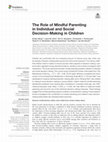Papers by Terri Seuntjens
European Journal of Psychological Assessment
. In recent years, different scales have been developed to assess individual differences in dispo... more . In recent years, different scales have been developed to assess individual differences in dispositional greed. We report two studies ( N1 = 300, N2 = 1,000) on the comparative psychometric properties of these scales. We find that all scales are reliable and that they correlate highly, suggesting that all can be used to assess dispositional greed. Exploratory factor analyses, using the Empirical Kaiser Criterion, the Hull method, and Parallel Analysis as extraction methods, were done on the separate scales and all items together. These analyses reveal that there is quite some consistency in the scales, as in both studies a one-factor solution seems to describe the data best. These results imply that these different scales all assess dispositional greed, although the results also suggest that some items may be deleted from the scales.
Personality and Individual Differences

Frontiers in Psychology
Children are confronted with an increasing amount of choices every day, which can be stressful. D... more Children are confronted with an increasing amount of choices every day, which can be stressful. Decision-making skills may be one of the most important "21st century skills" that children need to master to ensure success. Many aspects of decision-making, such as emotion regulation during stressful situations, develop in the context of caregiver-child interactions. This study examined whether mindful parenting predicts children's individual and social decision-making. The current study included 63 mother-child dyads from The Netherlands (Child M age = 5.11, SD = 0.88, 50.8% girls). Mothers completed the Dutch version of the Interpersonal Mindfulness in Parenting Scale (IM-P). A "Choice Task" was developed to measure individual decision-making skills, and a "Sharing Task" was created to measure social decision-making in young children. Higher maternal mindful parenting significantly predicted more sharing after controlling for covariates (child age, sex, SES, maternal education level; Wald = 4.505, p = 0.034). No main effect of maternal mindful parenting was found for any of the individual decision-making measures. These findings suggest that mindful parenting supports children's social decision-making. Future research should investigate if the combination of mindful parenting and children's early decisionmaking skills predict key developmental outcomes.

Although greed is both hailed as the motor of economic growth and blamed as the cause of economic... more Although greed is both hailed as the motor of economic growth and blamed as the cause of economic crises, very little is known about its psychological underpinnings. Five studies explored lay conceptualizations of greed among US and Dutch participants using a prototype analysis. Study 1 identified features related to greed. Study 2 determined the importance of these features; the most important features were classified as central (e.g., self-interested, never satisfied), whereas less important features were classified as peripheral (e.g., ambition, addiction). Subsequently, we found that, compared to peripheral features, participants recalled central features better (Study 3), faster (Study 4), and these central features were more present in real-life episodes of greed (Study 5). These findings provide a better understanding of the elements that make up the experience of greed and provide insights into how greed can be manipulated and measured in future research.











Uploads
Papers by Terri Seuntjens